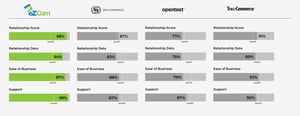Over 250,000 online sellers already use it.
Since starting at eZCom, I’ve not only learned about EDI but also the platforms that brands rely on to power their eCommerce stores. Shopify, WooCommerce, Big Commerce, Squarespace—if you have an online store or you’re developing one, you’ve heard the same names that I have. When you decide to start selling products online, there are myriad options when it comes to eCommerce and choosing the right one is challenging. But at some point in my conversations with online sellers, one name inevitably comes up: Magento. This open-source platform, now owned by Adobe, is the preferred solution for over 250,000 online merchants. By some measures, it is the most popular choice for eCommerce.
I wondered why so many companies chose Magento. What does it offer that makes it the solution that so many brands prefer? And finally, what kind of investment does it require?
I spoke to a Magento expert.
To begin my research, I wanted to connect with someone who really knows the ins-and-outs of Magento. I reached out to Brian Essig, the founder and president of web development agency Creating Digital.
Brian launched his firm in 2009, seeing an opportunity to develop web sites that married great design with the highest functionality. Developing, building, and maintaining web sites so they deliver the maximum value for clients is the focus at Creating Digital. When it comes providing an eCommerce solution, the company works extensively with the Magento platform.
“Magento has evolved so much since Version 1.0,” remarked Essig. “What I really like about it right now is how well it scales for mid-size and enterprise clients.”
For Essig, the biggest advantage of Magento is how well it scales for mid-size and enterprise clients. But, in his opinion, they’re not the only ones who can benefit from it.
“Every business has a life cycle and it’s important to think about what your business will look like in three years rather than just focus on where you are at the moment,” noted Essig. “We think Magento makes it easy for companies to grow as they expand their online business and their scope.”
Essig went on to explain that, once it’s built, a Magento site gets very close to being plug-and-play for many merchants. He also appreciates the fact that it offers flexibility—adjustments are easy to make as your business evolves.
“We like to talk to the people at a business to find out what their pain points are,” said Essig. “That helps us find the best solution.”
For merchants selling less than $1 million online and relatively uncomplicated needs, Essig and his team sometimes recommend WooCommerce, the WordPress plug-in. But he believes Magento is choice that will serve a company well as their business evolves.
“The platform makes it easy to automate so many tasks and there are all kinds of great Third-Party apps,” Essig noted. “It’s flexible, can be made truly custom, and we can build something that meets the specific needs of the merchant.”
How much will Magento cost?
While Magento is an open-source platform with a large community of users, using it won’t be free. You will need to pay for hosting and many of the apps you’ll use to make your online store a custom experience will come with a price tag. And unless you’re a pro developer, getting a site built isn’t going to be cheap. Expect to pay about $20,000 for the most basic site, with costs for the most advanced solutions going up to $100,000.
Magento Enterprise is designed for large brands, and gets even more expensive. Using that platform will cost you at least $100,000. The advantage is that with Magento Enterprise, you can be completely confident that your eCommerce store sales are handled.
Obviously, there are less expensive options for eCommerce than Magento. But for brands with the resources and complex online stores, they have found real value in the investment.
Is Magento right for you?
If you are a medium to enterprise-sized company, chances are good that Magento is a great platform for you. If you’re smaller but have a realistic expectation of serious growth, it could be the solution for your company, too.
I suggest you do your own due diligence. Talk to a developer or an expert you trust and be honest about your business. After all, choosing the right platform can make all the difference when it comes to having a successful online store.






